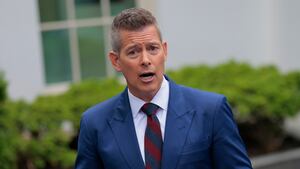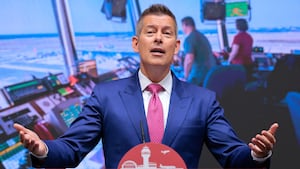A veteran air traffic controller has opened up in stunning detail about the Trump-era safety crisis currently roiling the U.S. travel industry.
Jonathan Stewart outlined in an on-the-record interview a recent close call at Newark-Liberty International Airport, and outlined the dangers of staffing shortages bedeviling the FAA.
In an interview with The Wall Street Journal, Stewart described the stress that comes with his job as supervisor at the Philadelphia site that oversees planes arriving at the New Jersey airport.
“It’s like a videogame, but it’s like playing 3-D chess at 250 miles an hour,” he told the outlet. “We are the guys that are guiding your pilots home.”
“I don’t want to be responsible for killing 400 people,” he added, noting that staffing shortfalls restrict the number of planes that can be effectively guided in for landing.
Stewart, who is among those on trauma leave, filed an internal safety report after a close call on May 4, in which two planes were flying toward each other at the same altitude. Stewart was able to help pilots change course, but was concerned about another equipment failure.
“The situation is, has been and continues to be unsafe,” Stewart wrote. “The amount of stress we are under is insurmountable.”
Stewart told the Journal that controllers should ideally spend two hours maximum working traffic. Before the May 4 near miss, he had worked three, according to the report.
While Stewart is expected to make more than $450,000 this year—overtime included—he is “sacrificing a lot for that,” Stewart said.
“You give up nights, weekends, holidays, birthdays, everything else. Your mental health and your physical health take a toll,” he added.
“Like anything else, you’re going to have a breaking point,” he said.
Near misses like the one on May 4 may not be stressful at the time, he explained. “But the thing about PTSD is this: For every time you have an incident—say a close call, a near-midair, God forbid—all of these things are cumulative."
As for the FAA and Transportation Secretary Sean Duffy pledging immediate action to address tech issues and low staffing at the nation’s 12th-busiest airport, Stewart reacted positively: “For the first time that I’m aware of, they are throwing money at the problem.”
Another air traffic controller warned earlier this month that, in the meantime, travelers should “avoid Newark at all costs.”
And Newark isn’t the only airport where air traffic controllers have experienced a momentary loss of contact with planes.
In Denver on Monday, transmitters stopped functioning for up to six minutes, prompting an FAA investigation.
Just the day before, Duffy had seemingly predicted the incident.
“What you see in Newark is going to happen in other places across the country,” he said on NBC’s Meet the Press, pinning the blame on outdated technology and subpar oversight by Congress.
“It has to be fixed, and so what we’re having is some telecom issues, but we’re also having some glitches in our software,” he said. “As the information comes in, it’s overloading some of our lines, and the system goes down.”

